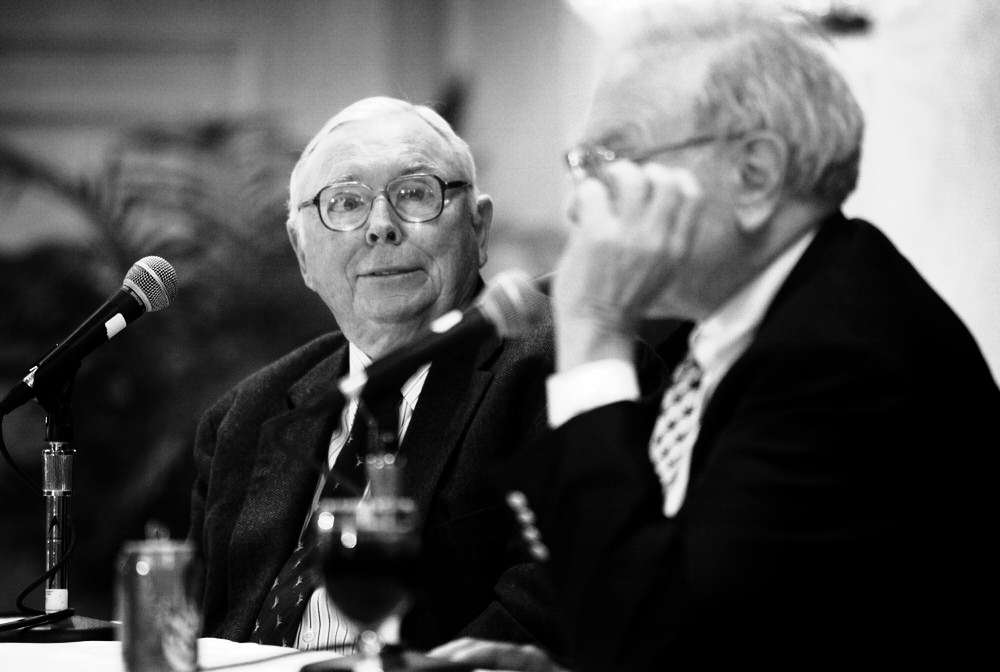by William Smead, Tony Scherrer, and Cole Smead, Smead Capital Management
Charlie Munger set the tone for the 2019 Berkshire Hathaway Annual Meeting. He said that people involved in creating cryptocurrencies, “honored the life and work of Judas Iscariot.” On many major subjects, questions were fired at Warren Buffett and Charlie Munger related to short comings which self-proclaimed expert observers see at Berkshire. These questions seemed to ask the same question each time. Which Berkshire employee/executive is the one who let everyone down even though they appeared to be giving their best effort? [backc url='http://www.dynamic.ca/leadership/eng/active.html?fund=dreii2f&utm_source=aa&utm_medium=banner&utm_campaign=alts_2019&utm_content=dreii2f']
A little history lesson is needed from the New Testament of the Bible. Judas Iscariot was an apostle of Jesus Christ, who went everywhere with him during a three-year traveling ministry. He handled the finances of the ministry. Unfortunately for Judas, he was chosen by God to be the one apostle who committed mutiny and turned Jesus over to the governing bodies of the day. The Romans didn’t like Jesus, because he was considered a threat to political power and the religious leaders didn’t like him usurping their religious authority.
Repurchasing Berkshire Shares
Many of us have wondered if Warren was being a Judas when it comes to piling up $100 billion in cash and not using it in late December or early January to buy up cheap Berkshire (BRK) shares. Remember, Judas handled the cash. Buffett’s argument against doing it was both interesting and discouraging for an optimist. He said, “the shares didn’t get to the kind of big discount to intrinsic value that it would in a major market decline, when we could use it to benefit shareholders even more.” He went on, “If we were partners in a business valued at $2 million and you offered your half to me for $300,000.00, I couldn’t get the cash to you fast enough.” Therefore, Buffett is asking us to expect to see a huge buy-back when Berkshire shares, or the entire market, go through a massive decline. Looks like a backstop to us, not asset allocation. We wonder why he is excited about Apple buying back shares and isn’t telling them to wait for a better entry point.
Kraft-Heinz Problems
Was 3G Partners a Judas in disguise in this debacle and a huge write down? Warren and Charlie took the bullets for everyone involved by explaining that the error in the deal was paying way too much for the purchase of Kraft. They chalked it up to the fact that even the greatest business buyer of all time has a few duds. Buffett explained that food tastes aren’t changing as much as you might think. We can back that up, because our grandkids between three and nine years old eat out of the five main food groups (chicken fingers, cheese pizza, toasted cheese sandwiches, mac-n-cheese and cheese burgers with fries). Those that write off cheese and ketchup could look foolish in the future for giving up on these brands.
Investing in Amazon
Is Todd Combs or Ted Weschler a Judas Iscariot among the value-investing disciples of Berkshire Hathaway? One of them purchased shares during the first quarter in Amazon, which has made a parabolic move up in the recent decade and is favored by all 45 Wall Street analysts which follow the stock. Based on prior comments from Buffett and Munger, they’ve thrown this stock into the “too-hard to analyze pile” for many years. Munger has described it as “an act of nature,” intimating there is no way to figure it out. Also, Buffett and Munger are famous for using their favorite adage, “be fearful when others are greedy and greedy when others are fearful.” Making an investment in Amazon could be called a lot of things, but those bullish Wall Street analysts don’t look fearful to us. Can we raise another price target?
We will be interested to find out whether the purchase of Amazon was before or after Jeff Bezos gave the National Enquirer its day in the sun. Buffett was famous for his testimony to Congress in the aftermath of the Salomon Brothers scandal. “Lose money for the firm and we will forgive you. Lose one ounce of the company’s reputation and we will be ruthless.” In fact, Buffett’s appearance before Congress was in the opening video Saturday (Susan Buffett did a great job on the opening video). Warren seems to have lost his ruthlessness!
Buffett chose to frame the purchase in the context of Aesop’s fable, “A bird in the hand is worth two in the bush!” He says, “Which ever of his lieutenants bought Amazon, they believe that the two in the bush for the shares is actually three, four or more.” Buffett always believes that value comes from buying a future income stream for well below what it is worth and includes a margin of safety. Perhaps he has handed over his shrewdness to this market’s power to conform professional investor behavior.
Wells Fargo (WFC)
The stock market, regulators and politicians have been clamoring for the Judas Iscariot to be exposed at Wells Fargo. Charlie Munger expressed his frustration, bordering on anger, of the pushing out of CEO Tim Sloan. Therefore, Tim Sloan was not the problem and the Judas must have been prior CEOs. It is safe to say that this company, which has been around since 1855, is one that Warren and Charlie believe in going forward.
Socialism
Investors are wondering if Warren is a Judas in his support for Democratic candidates while the biggest names in the party are proposing clearly socialist policies. Buffett said, “I’m a card-carrying Capitalist.” He reminded everyone that Berkshire Hathaway is run on a politically agnostic basis and he doesn’t use any company funds to make campaign contributions. He said that certain businesses like Berkshire Energy and BNSF Railway are in industry PACs, but that is essential because they are in heavily-regulated industries.
Healthcare/Medical Cost
Buffett seems to believe that our healthcare system is a Judas Iscariot. He calls it the “tapeworm of American competitiveness in the world economy.” For a guy who was cured of prostate cancer in the last decade, this is an interesting posture. He explains that we have gone from 5% of gross domestic product devoted to healthcare to 18% and said that the number is likely to grow. He seems to think that bringing the Messiahs (Jeff Bezos and Jamie Dimon) into a partnership can do something about it.
Most of the money spent on us for medical care in our lifetime is spent in the last five years of our life. We would suggest that having the first large population group, baby boomers, hitting their 70s, will cause more medical needs the next 15 years. In turn, the grim reaper will reduce the silent generation and baby boomers who are the most expensive medical customers over time. Once Generation X replaces the boomers as the largest elderly group and a massive number of Millennial and Generation Z folks move into their prime employment years, those paying into the healthcare system will exceed those being treated. Is it possible that Adam Smith’s invisible hand will work once again and time will solve this? Christ didn’t have to beg Judas to betray him.
Conclusion
We are ever grateful to Warren Buffett and Charlie Munger for sharing their wisdom and investment discipline with us. There is always going to be human failure, but it rarely comes anywhere near to the Judas Iscariot level Charlie ascribed to cryptocurrencies. We believe all the questions looking to place blame are symptomatic of a market which has devalued higher margin of safety/value investing strategies. We are very comfortable having one of the highest levels of like holdings with Berkshire’s common stock portfolio (measured by Morningstar) and are especially pleased to hear how positive these masters are on our holdings of Bank of America (BAC), American Express (AXP) and the temporarily-suffering Wells Fargo (WFC). Maybe next year the questions will all be about what Warren and Charlie did right.
Warm regards,
The information contained in this missive represents Smead Capital Management’s opinions, and should not be construed as personalized or individualized investment advice and are subject to change. Past performance is no guarantee of future results. Bill Smead, CIO and CEO, Tony Scherrer, CFA, Director of Research, and Cole Smead, CFA, Managing Director wrote this article. It should not be assumed that investing in any securities mentioned above will or will not be profitable. Portfolio composition is subject to change at any time and references to specific securities, industries and sectors in this letter are not recommendations to purchase or sell any particular security. Current and future portfolio holdings are subject to risk. In preparing this document, SCM has relied upon and assumed, without independent verification, the accuracy and completeness of all information available from public sources. A list of all recommendations made by Smead Capital Management within the past twelve-month period is available upon request.
©2019 Smead Capital Management, Inc. All rights reserved.
This Missive and others are available at www.smeadcap.com.













